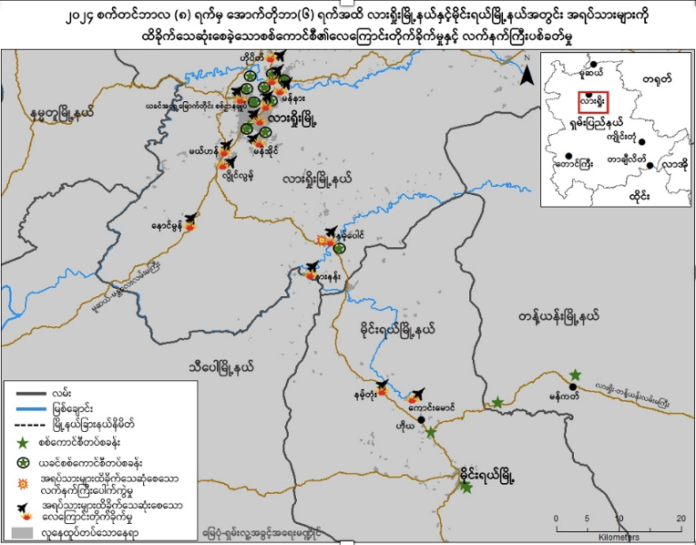An interview with SHRF spokesperson Ying Leng Harn on the aerial threats and hardships faced by local residents living in areas controlled by the Three Brotherhood Alliance members
The Shan Human Rights Foundation (SHRF) reported on 9 October that civilian casualties have increased due to airstrikes by the military in areas controlled by resistance forces in northern Shan State.
According to the SHRF statement, within six weeks from 26 August to 6 October, airstrikes and artillery shelling by military junta forces in Hsipaw, Kyaukme, Nawnghkio, Namkham, Namtu, Lashio, and Mongyai Townships resulted in 55 civilian deaths and 139 injuries.
The statement reports that the junta forces targeted towns controlled by the Ta’ang National Liberation Army (TNLA) and the Myanmar National Democratic Alliance Army (MNDAA), resulting in civilian casualties as well as the destruction of over 450 buildings, including schools, pagodas, hotels, and universities.
Shan News conducted this interview with SHRF spokesperson Ying Leng Harn to learn more about the current human rights violations by junta forces in northern Shan State, the concerns about aerial threats among local residents who remain in areas controlled by members of the Three Brotherhood Alliance (3BHA), and the hardships they are facing.
Q: How many civilian casualties were recorded in the survey within six weeks?
A: In our survey, we recorded a total of 55 deaths. There were over 130 injured. This is from six townships where we collected data. The actual numbers on the ground could be higher. This is based on the information we’ve gathered from the ground, so it could be more. Of the 55 deaths, 10 percent were due to heavy weapons. 90% were due to airstrikes. Most of these 55 deaths were women and children.
Q: How concerned are people about the military council’s airstrikes on six towns in northern Shan State after Operation 1027?
A: At the beginning of “Operation 1027”, people fled to other towns and villages. As the military operation continued, it was not easy for them to stay in the places they had fled to. So, they returned to their own towns and villages. When locals returned to their towns and villages, the military council bombed areas in and around the towns where civilians were staying. Now the people have nowhere to run but to face all the dangers that may come their way.
If they flee, they face hardships as displaced persons. The military deliberately bombs towns where there are displaced people and fighting is taking place. They are also restricting food supplies and blocking roads. People are worried but stay because they have no other choice and cannot flee. Some people are now only thinking about how to stay safe and where to hide when the military carries out airstrikes.
Q: How serious are the current human rights violations by the military, especially against children and women?
A: According to our surveys and analyses, children and women make up a significant proportion of those killed and injured by airstrikes. They are severely affected. Whether intentionally or not, when they carry out bombings, they are severely affected.
Q: What is the situation in the towns in Shan State that the military is primarily targeting with airstrikes? What kind of hardships are the civilians facing?
A: In the towns, some people are staying in IDP camps, while others are on the run. About half of the population remains in the towns, especially in Hsipaw. For Lashio, it is hard to give an exact number as people move irregularly.
People live in fear. They are constantly wondering when a bomb might fall on their heads. In most towns, residents remain, facing difficulties with basic needs. The military council has cut off essential medicines and fuel supplies. It’s extremely challenging for the civilians.
Q: As SHRF, what would you say about the current human rights violations by the military council?
A: We need to question the international organizations that are supporting or assisting the military council. The military is deliberately bombing civilians with aircraft. This amounts to a war crime. Those who continue to supply jet fuel and cooperate with the military are equally complicit in these human rights violations, knowing their unjust actions.
China is currently supporting the military council. Our records clearly show this. Many of the areas bombed by the military significantly overlap with China’s economic investments. China should reconsider whether it wants to continue to support the military council, as this hurts its own investments and projects. These are other points I wanted to mention that were not included in the official statement.
Sent by Shan News.

